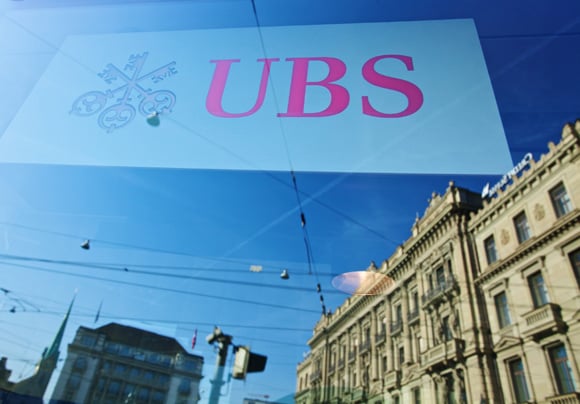Swiss giant cutting investment banking services to focus on private banking and wealth management services
UBS AG, Switzerland's biggest bank, will aim for return on equity of between 12 percent and 17 percent starting in 2013 as it shrinks the investment bank to focus on wealth management.
The Zurich-based bank also plans to pay a dividend of 10 centimes a share for 2011, its first cash payout since before the start of the financial crisis, it said in a statement today. Top executives are speaking to investors in New York.
UBS is scaling down fixed-income businesses as stricter capital requirements and the European sovereign debt crisis hurt profitability. Chief Executive Officer Sergio Ermotti, who took over from Oswald Gruebel following the discovery of a $2.3 billion loss from unauthorized trading in September, is responding to investor pressure to shrink the investment bank. The bank plans to cut risk-weighted assets at the division by 145 billion Swiss francs ($158 billion) under Basel III rules by 2016 from about 300 billion francs currently.
“Ermotti has to watch out that scaling down doesn't become too expensive,” said Dirk Becker, a Frankfurt-based analyst at Kepler Capital Markets. “It will be pretty painful for all banks. They all want to get done with asset reductions as soon as possible, but few are preparing for the fact that many players will be getting out of many assets at the same time.”
UBS fell 32 percent to 10.49 francs in Zurich trading this year, compared with a 35 percent decline in the 46-company Bloomberg Europe Banks and Financial Services Index.
Lower ‘Risk Profile'
Ermotti, 51, who became interim CEO after Gruebel quit, was confirmed in that role on Nov. 15.
“We have chosen to substantially reduce the risk profile of the bank by exiting and downsizing businesses which are not value added to our client franchise or deliver unattractive risk-adjusted returns,” he said in the statement today.
The investment bank will shrink its long-term rates business, almost halving the risk-weighted assets of the macro unit, which also includes foreign-exchange trading. Assets at the credit and emerging markets businesses will be cut by about a quarter each by 2016, while legacy assets, such as auction-rate securities, will be exited completely.
The investment bank will also exit asset securitization, complex structured products, macro-directional trading and equity proprietary trading, slides from the presentation of investment-banking chief Carsten Kengeter showed. The bank wants to build up its commodities business and the special situations group.
The investment bank will aim for headcount of about 16,000 in the future, Ermotti said. The reduction from 17,878 at the end of September will be achieved through job cuts announced in August, and as the bank exits or scales back businesses and through natural attrition, he said.
Credit Suisse
The return on equity target compares with a goal of 15 percent to 20 percent announced two years ago.
UBS, which abandoned its previous profit goals in July, isn't alone in cutting targets and shrinking its securities arm. Zurich-based Credit Suisse Group AG (CSGN), Switzerland's second- largest bank, said earlier this month it will eliminate about 1,500 positions, in addition to 2,000 announced in July, and trim risk-weighted assets by 110 billion francs, including almost 100 billion francs at the fixed-income unit, by the end of 2014.
Credit Suisse cut its return-on-equity goal in February to more than 15 percent from more than 18 percent previously, citing stricter regulation and challenging markets. Barclays Plc set an ROE target in February of 13 percent for 2013, down from an average of 18 percent over the past 30 years.
‘Tricky' Execution
“Everybody is doing the same thing” because Basel III rules are hard on investment banks, said Christopher Wheeler, a London-based analyst at Mediobanca SpA. “It's a massively complex execution of getting out of businesses without damaging the franchise that you want to keep, keeping up the morale of people, avoiding losses on the rundown of the books. It's going to be very tricky indeed.”
The shift in strategy coincides with another round of management upheaval at UBS, which was ravaged by more than $57 billion of credit-related losses during the financial crisis of 2008. Wheeler cut his rating on UBS to “underperform” from “outperform” after the September departure of Gruebel, 67. Chairman Kaspar Villiger is leaving in 2012, a year earlier than planned, to make way for former Bundesbank President Axel Weber in the role.
‘New Guy'
Tom Naratil became chief financial officer in June, replacing John Cryan, after serving as CFO and chief risk officer of UBS's wealth management Americas unit. Maureen Miskovic, a former risk officer at Boston-based State Street Corp. and Lehman Brothers Holdings Inc. of New York, took over as group chief risk officer in January.
“It's hard for anyone to make it in investment banking at the moment,” said Matthew Clark, a London-based analyst at Keefe, Bruyette & Woods Ltd. “The question is in execution. The ingredients are all there, but the manager that was entrusted to deliver that story is no longer there, so we really need to see how the new guy does.”







